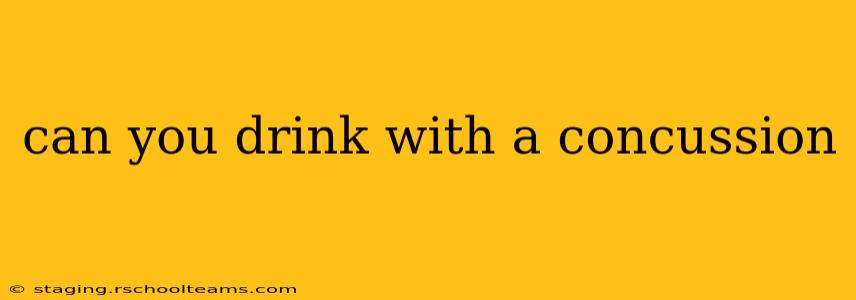Can You Drink Alcohol With a Concussion? The Short Answer is No.
The simple answer is a resounding no. Drinking alcohol after a concussion is strongly discouraged and can significantly hinder your recovery. While a casual drink might seem harmless, the effects of alcohol on the brain, especially after a traumatic brain injury (TBI) like a concussion, are detrimental and can prolong your recovery time, potentially leading to more severe long-term consequences.
This isn't just a matter of feeling unwell; it's about the physiological effects of alcohol on your already-injured brain.
What Happens to Your Brain After a Concussion?
A concussion causes microscopic damage to the brain, disrupting its normal function. This damage manifests in various ways, including headaches, dizziness, nausea, memory problems, and cognitive difficulties. Your brain needs time and rest to heal from this trauma.
How Does Alcohol Affect Concussion Recovery?
Alcohol is a central nervous system depressant. This means it slows down brain activity, potentially exacerbating the effects of the concussion. Here's how:
- Increased Inflammation: Alcohol can increase inflammation in the brain, hindering the healing process. The brain needs to reduce inflammation to repair itself, and alcohol works against this.
- Impaired Healing: Alcohol interferes with the brain's ability to repair itself after injury. It disrupts the delicate balance of neurochemicals and slows down the natural restorative processes.
- Exacerbated Symptoms: Alcohol can worsen concussion symptoms, including headaches, dizziness, nausea, and cognitive impairment. This can prolong your recovery and make daily life significantly more challenging.
- Increased Risk of Complications: In severe cases, alcohol consumption after a concussion can increase the risk of serious complications, such as prolonged cognitive deficits, post-concussion syndrome, or even bleeding in the brain.
How Long Should You Avoid Alcohol After a Concussion?
There's no definitive timeframe, as recovery varies greatly from person to person. However, it's crucial to abstain from alcohol until you're fully recovered and cleared by a medical professional. This could take several weeks or even months, depending on the severity of your concussion. Your doctor will assess your progress and advise you when it's safe to resume alcohol consumption.
What Should You Do Instead?
Focus on these crucial elements of concussion recovery:
- Rest: Get plenty of sleep and avoid strenuous activities.
- Hydration: Drink plenty of water.
- Healthy Diet: Eat nutritious foods to support brain function.
- Medication: Follow your doctor's instructions regarding any prescribed medications.
- Medical Follow-up: Attend all scheduled appointments with your doctor or neurologist.
What if I Accidentally Drank Alcohol After My Concussion?
If you accidentally consumed alcohol after sustaining a concussion, contact your doctor or seek medical attention immediately. They can assess your condition and advise you on the best course of action.
Does This Apply to All Types of Head Injuries?
While this advice primarily focuses on concussions, the principle remains the same for other forms of traumatic brain injuries. Alcohol should always be avoided after any head injury until a doctor clears you.
What Are the Long-Term Effects of Alcohol Use After a Concussion?
Long-term effects of alcohol consumption following a concussion can be severe and potentially irreversible. These include persistent headaches, cognitive difficulties (memory problems, difficulty concentrating), emotional instability, and increased risk of developing chronic post-concussion syndrome. The longer you consume alcohol and the greater the quantity, the more likely these detrimental effects will be significant.
By prioritizing your health and following medical advice, you can significantly improve your chances of a full and speedy recovery from a concussion. Remember, your brain's health is paramount.
